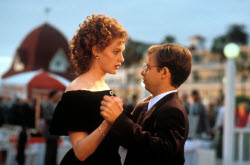Yesterday, Leah Libresco, a well-known blogger announced that she is converting from atheism to Catholicism. The reaction was immediate, chaotic and forceful. Catholics flocked to her comments section to offer congratulations and welcome her home. Atheists were largely confused, but also angry, saddened and sometimes cynical about the news. Some claimed to have seen this coming from a mile away – she had been studying Catholicism for a long time initially as part of a deal she made with her ex-boyfriend.
I have not been a regular reader of Leah’s blog, although I have read it on occasion. I’m a big fan of her ideological Turing test experiment – whereby atheists and Christians post both as themselves and as a person of the “opposite” viewpoint and others have to guess who is who.
I was shocked by the news, and especially by her reasoning. In addition to atheist-to-Catholic convert Jennifer Fulwiler, Leah is the second atheist I have heard of to convert to Catholicism in part because of the belief that an objective moral truth exists and is incompatible with atheism. This is a belief I also hold, but it keeps me more in the spectrum of militant agnostic – weak theist than it convinces me that Catholicism is true or right. How could someone with the same belief come to such a different conclusion?
Although I was raised a Catholic, I left the church for several reasons. Mainly that I did not believe their teachings on sexuality had any place in reality and that I feared my disagreement on this topic would lead to my excommunication. When I embraced Unitarian Universalism, I did so because I could with the knowledge that any disagreements I have would probably not lead to my departure and because their statement of principles is an expression of my deepest moral beliefs.
This question of values is what boggled me so about Leah’s conversion. She is openly bisexual and a passionate supporter of same sex marriage rights. I don’t understand how someone who fits that description could make the informed decision to convert to Catholicism.
Nonetheless, in the comments section of her blog I wished her well. Changing religions is difficult, as I have experienced in my own life, and my conversion was not as public as Leah’s. And while I feel the urge to defend her from the mean spirited comments some are leaving – that she is doing it for attention, that she’s unintelligent, I also find myself bursting with questions, accusatory ones that I don’t know how to ask.
Someone in the comments, Matthais777, wrote:
I just sort wanted to say that I’m very sorry to hear this… Now that you’ve accepted catholisim, i hope your ready to accept what that means. Especially since you’ve chosen Catholisim.
It means, By definition, you must reject the GLBTQ community, like myself.
It means, by definition, you must believe that i and my fellow non-believers are going to hell. Whether that means eternal seperation, or eternal torture, you still believe that our actions deserve that.
…
It means, by definition, you believe in the subjegation of women through denial of abortion services, birth control, and the right to hold postion of authority on spiritual matters.
And leagues more.
And I couldn’t help nodding along. I’m frustrated that Leah would support such a sexist and homophobic institution that covers up the rape of children. I want to repeat every point Greta Christina made in her post “Why are you still Catholic?” But I feel oddly guilty demanding answers from this new convert. What about her free and responsible search for truth and meaning? It seems obvious to me that Catholicism is not a responsible choice, though I can’t help feeling arrogant in making that accusation.
In choosing to blog publicly about this to answer some questions and respond to comments, she’s opening up her decision for discussion. And there is so much to say.
I seconded the question someone else asked in the comments – “Why Catholicism and not some kind of virtue ethic deism?” And Leah responded:
The very short answer as to why not Deism is that it seems too hands off for the way Goodness would treat us, especially when we so badly need its help. The why Catholicism is mostly based in the fact that, while I’ve been fighting with Catholics for the last two years, they had a lot of times where they or the books they recommended exposed a major error I was making and helped me live better when I changed my philosophy or behavior on smaller scale things than this.
And the first thing I thought was, This totally ignores the problem of evil! My mind ping ponged back and forth between the various Catholic apologetics I am familiar with and my current lapsed beliefs.
It’s not just well known bloggers in the midst of a crisis of faith that I’m considering while writing this post. I often wonder how much I should talk up Unitarian Universalism to people who are considering changing their religion. I read today on a UUA blog that,
The average Unitarian Universalist only invites a person to church once every 26 years.
We have a long way to go before we gain a reputation for being pushy and evangelizing. But like most UUs, I have no desire to be anywhere near that line. Yet we are also frequently hearing from our leaders that as more Americans grow disenchanted with traditional organized religions, we are being presented with the opportunity to share our faith and gain new members in a way we have not before. Could Leah Libresco have become a Unitarian Universalist? Probably not – for various reasons she has been pursing Catholicism for a long time. But there are others out there who would benefit from our message. We have made the choice to become UUs, there are likely others who would given the chance.
Like everyone else, I’m going to wait and see what Leah posts over the next few days. I look forward to the conversation that follows.
*The tagline of Leah’s blog has been alternately “A geeky atheist picks a fight with her Catholic boyfriend” “A geeky atheist picks a fight in good faith” and is now “A geeky convert picks fights in good faith.” She has stated, “It’s much more important to respect people than beliefs, and picking a fight is respect — it means you care about someone and want to lead them out of error.”




